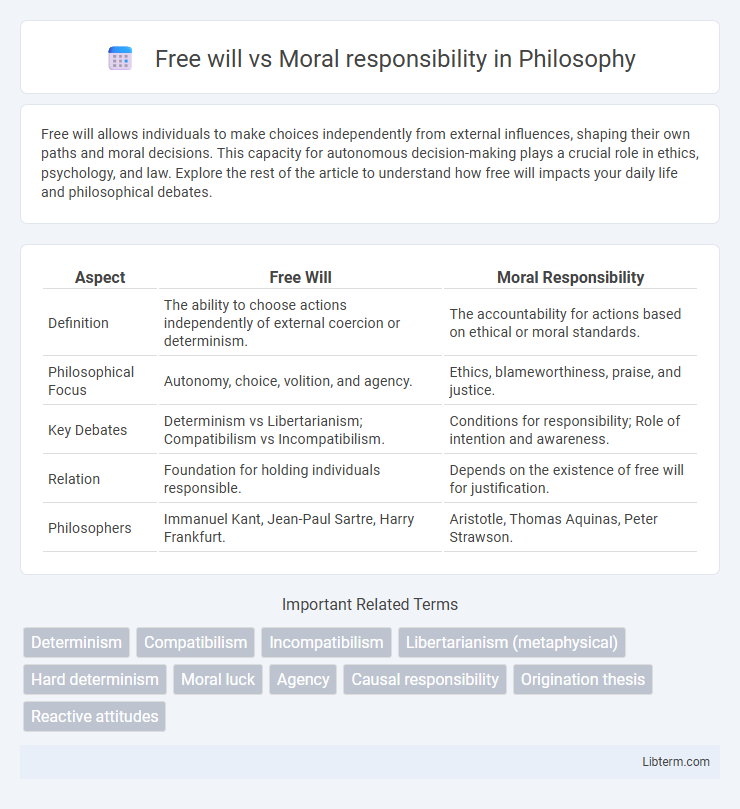Free will allows individuals to make choices independently from external influences, shaping their own paths and moral decisions. This capacity for autonomous decision-making plays a crucial role in ethics, psychology, and law. Explore the rest of the article to understand how free will impacts your daily life and philosophical debates.
Table of Comparison
| Aspect | Free Will | Moral Responsibility |
|---|---|---|
| Definition | The ability to choose actions independently of external coercion or determinism. | The accountability for actions based on ethical or moral standards. |
| Philosophical Focus | Autonomy, choice, volition, and agency. | Ethics, blameworthiness, praise, and justice. |
| Key Debates | Determinism vs Libertarianism; Compatibilism vs Incompatibilism. | Conditions for responsibility; Role of intention and awareness. |
| Relation | Foundation for holding individuals responsible. | Depends on the existence of free will for justification. |
| Philosophers | Immanuel Kant, Jean-Paul Sartre, Harry Frankfurt. | Aristotle, Thomas Aquinas, Peter Strawson. |
Introduction to Free Will and Moral Responsibility
Free will refers to the capacity of individuals to make choices unconstrained by external forces, forming the foundation of moral responsibility. Moral responsibility involves holding agents accountable for their actions based on the assumption that they have control over their decisions. Understanding free will is essential for evaluating ethical accountability and the justification of praise or blame.
Defining Free Will: Key Philosophical Perspectives
Free will is commonly defined as the capacity of agents to choose actions freely, without external coercion or determinism. Philosophical perspectives such as libertarianism argue for genuine autonomous choice, while compatibilism holds that free will can coexist with determinism by emphasizing internal motivations aligned with moral reasoning. Understanding these viewpoints is essential for exploring the connection between free will and moral responsibility, as the ability to act freely underpins accountability.
Understanding Moral Responsibility in Ethics
Moral responsibility in ethics hinges on the capacity for free will, where individuals are held accountable for actions they can consciously control and choose. The philosophical debate explores how free will enables moral agents to make decisions that justify praise or blame, emphasizing intentionality and awareness of consequences. Understanding moral responsibility requires analyzing the interplay between autonomy, ethical norms, and the conditions under which actions reflect personal moral agency.
The Relationship Between Free Will and Accountability
Free will underpins the concept of moral responsibility by enabling individuals to make autonomous choices that can be evaluated ethically. Accountability relies on the premise that agents possess the capacity to act freely, distinguishing voluntary actions from those compelled by external forces. The extent of free will directly influences judgments of praise, blame, and legal liability in societal and philosophical contexts.
Determinism’s Challenge to Moral Responsibility
Determinism challenges moral responsibility by asserting that every action is the inevitable result of prior causes, leaving no room for free will or genuine choice. If human behavior is pre-determined by genetics, environment, and causality, assigning moral blame or praise becomes problematic. This raises critical questions about accountability, punishment, and ethical frameworks in a deterministic universe.
Compatibilism: Reconciling Free Will and Determinism
Compatibilism asserts that free will and moral responsibility are compatible with determinism by redefining free will as acting according to one's desires and motivations without external coercion. This philosophical stance maintains that individuals can be held morally responsible for their actions even if those actions are determined by prior causes. Key figures supporting compatibilism include Thomas Hobbes and Daniel Dennett, who argue that freedom lies in the capacity to act according to internal states rather than being uncaused.
Libertarianism: The Case for Genuine Choice
Libertarianism in the free will debate asserts that individuals possess genuine choice, enabling moral responsibility independent of deterministic causation. This perspective emphasizes the capacity for agents to initiate actions not predetermined by prior events, grounding accountability in true autonomy. Empirical and philosophical arguments highlight the importance of uncaused causes to preserve meaningful ethical responsibility within this framework.
Implications for Law and Justice Systems
The debate between free will and moral responsibility profoundly influences law and justice systems by shaping concepts of accountability and culpability. Legal frameworks often presume individuals possess free will to justify punishment and rehabilitation, but challenges arise when neuroscientific findings suggest behavior may be driven by factors beyond conscious control. Courts increasingly grapple with balancing deterministic perspectives and moral responsibility to ensure fair sentencing and uphold justice while considering potential impairments to volition.
Contemporary Debates on Free Will in Neuroscience
Contemporary debates on free will in neuroscience challenge traditional notions of moral responsibility by examining how brain activity precedes conscious decision-making, suggesting that actions may be initiated subconsciously. Studies using techniques like fMRI and EEG have revealed predictive neural patterns seconds before individuals report making choices, raising questions about the autonomy of volitional acts. This scientific evidence prompts ethical discussions about accountability and the extent to which individuals can be held morally responsible for behaviors influenced by neurobiological processes.
Conclusion: The Future of Free Will and Moral Responsibility
The future of free will and moral responsibility hinges on advancements in neuroscience and philosophy reshaping traditional concepts of autonomy and accountability. Emerging evidence on brain determinism challenges the notion of absolute free will, prompting a reevaluation of legal and ethical frameworks to balance societal order with compassion. Integrating interdisciplinary insights will be crucial in developing a nuanced understanding that respects both individual agency and systemic influences.
Free will Infographic

 libterm.com
libterm.com